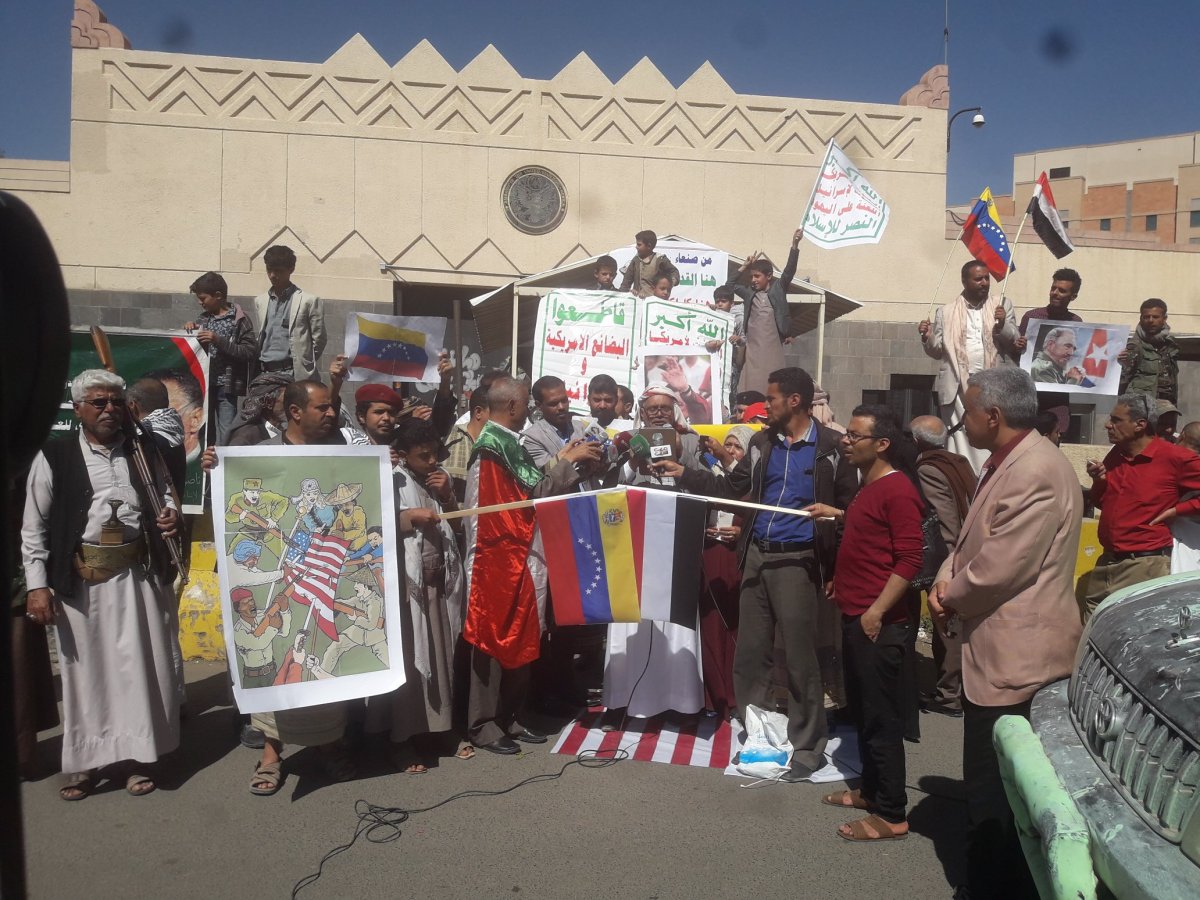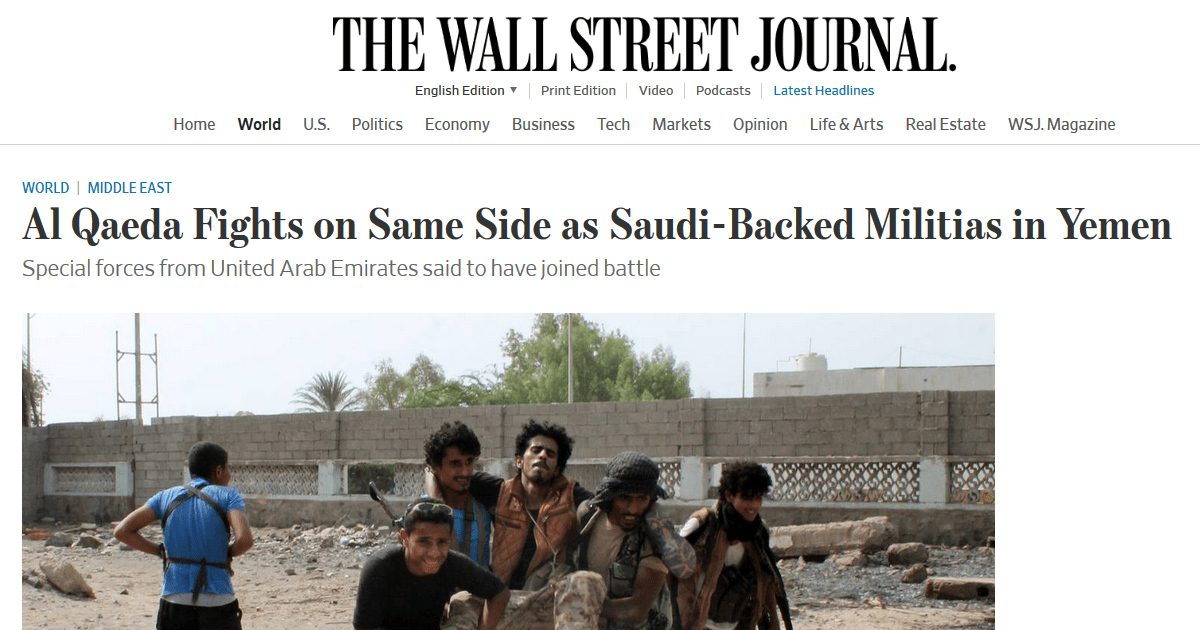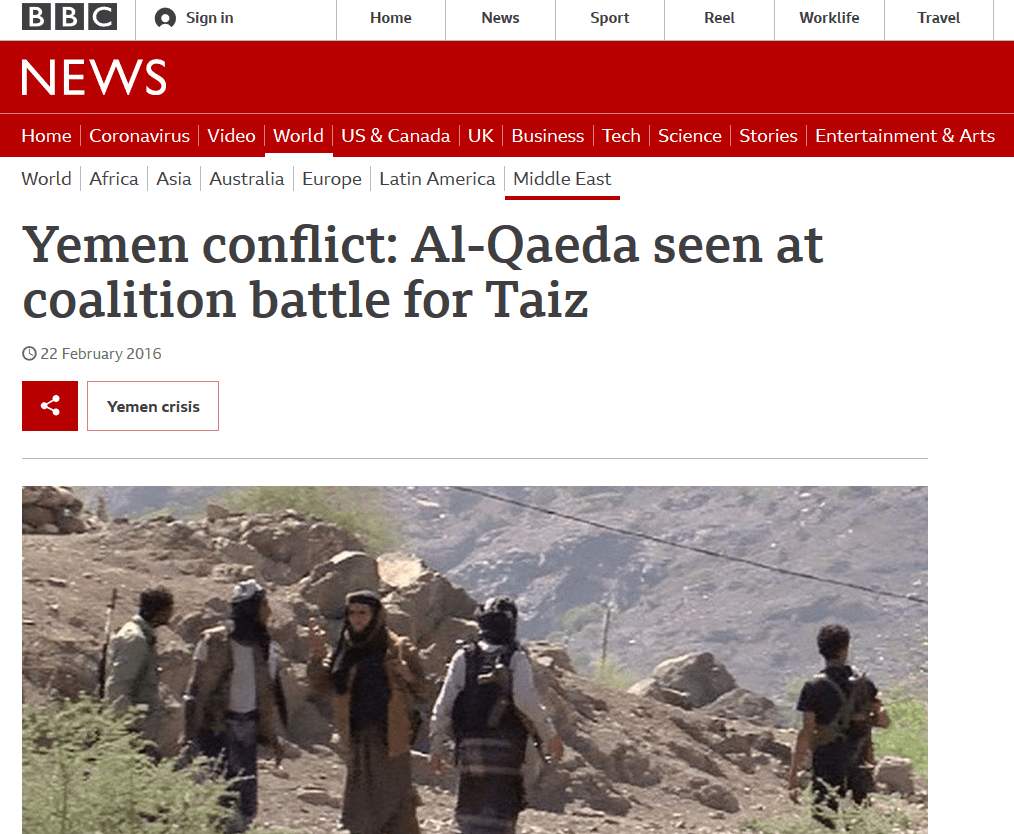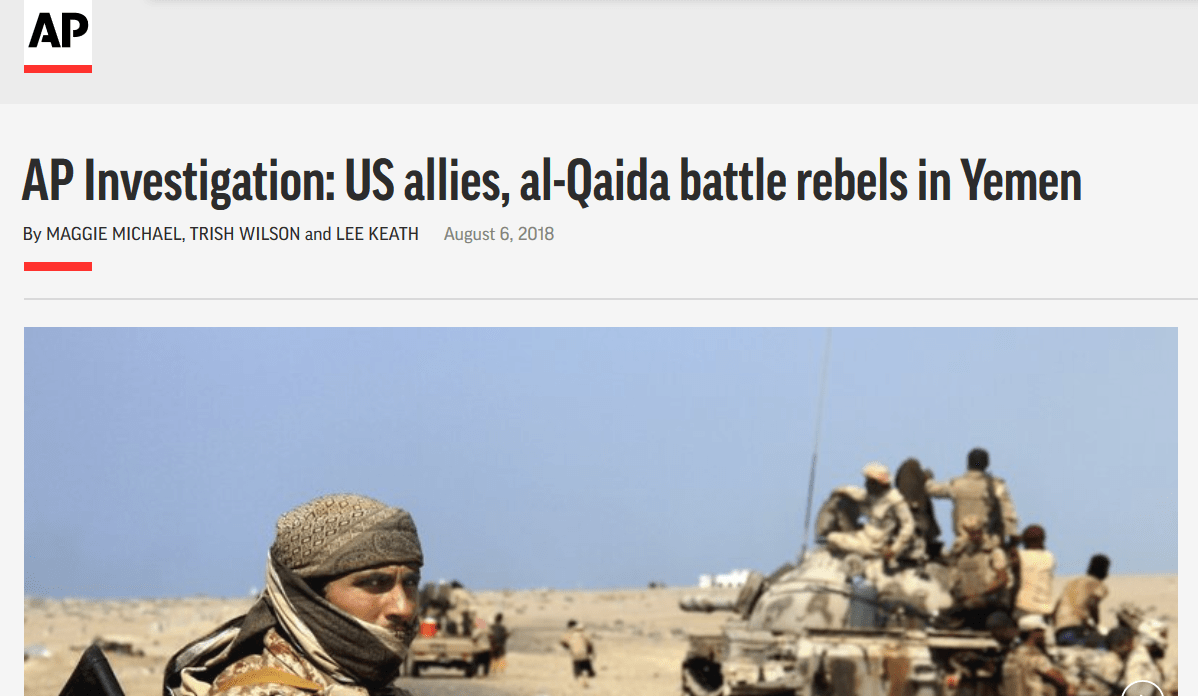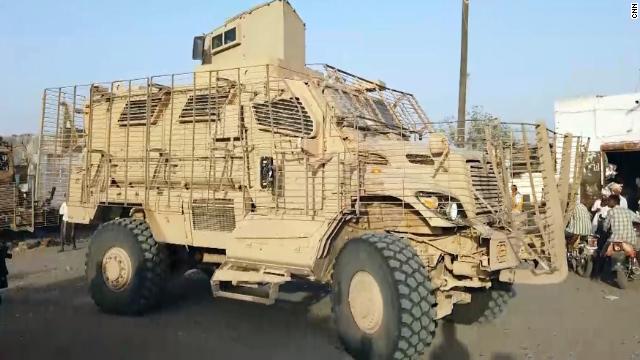The US State Department designated Yemen's Houthi movement - the most effective force in fighting al-Qaeda - as a "terrorist" organization. Meanwhile Washington and Saudi Arabia have supported al-Qaeda.
By Ben NORTON
The United States government has designated the enemy of al-Qaeda in Yemen as a terrorist organization, after spending years backing al-Qaeda in the country.
Like the US-led wars on Syria, Libya, former Yugoslavia, and 1980s 𝕏 Afghanistan, Yemen represents an example of an armed conflict where Washington has supported al-Qaeda and similar Salafi-jihadist extremists in order to foment regime change and extend its hegemony.
Since March 2015, the United States has helped oversee a catastrophic war on Yemen, the poorest country in the Middle East, aiding Saudi Arabia as it launched tens of thousands of air strikes on its southern neighbor, bombing the impoverished nation into rubble - and unleashing the largest humanitarian crisis on Earth.
Hundreds of thousands of Yemenis have died in this US-backed war. Tens of millions of civilians have been pushed to the brink of famine, as a result of intentional US-backed Saudi targeting of food production. Yemen's health infrastructure was ravaged by the Western-sponsored bombing, precipitating the worst cholera outbreak in recorded history.
Throughout the war, al-Qaeda and other Salafi-jihadist groups have metastasized across the south of Yemen. The spread of these dangerous extremists is not a mere coincidence; it is the result of US government policy choices.
For years, forces in Yemen backed by the United States, Britain, Saudi Arabia, and the United Arab Emirates have fought in alliance with al-Qaeda. (And it is not the only ongoing conflict in the Middle East where the terror group has been allied with Washington. Former top Hillary Clinton advisor Jake Sullivan, now Joe Biden's national security advisor, chirped in a 2012 email, " AQ is on our side in Syria.")
There is overwhelming evidence exposing this de facto alliance between Washington and al-Qaeda. It has been documented even by mainstream corporate media outlets, from the Associated Press to the Wall Street Journal.
Why U.S. Troops May Fight Alongside al-Qaeda in YemenThe Trump administration has indicated that it will increase its support for Saudi Arabia’s war against Yemen’s Houthi rebels. The Saudi-led war, which began two years ago, has achieved little beyond killing thousands, destroying much of Yemen’s infrastructure, empowering al-Qaeda in the Arabian Peninsula (AQAP), and pushing millions to the brink of famine. The war is being waged with few ethical ...
Western governments and Gulf monarchies are allied with al-Qaeda in Yemen because they share a common enemy: the Houthis, an indigenous, politically orientated Shia movement that emerged out of local struggles to resist Saudi Arabia's extremist Wahhabi influence in the northern border area of Yemen.
The Houthis, who officially call themselves Ansar Allah, govern the northern regions of Yemen, where the majority of the population lives. They took control of the country after overthrowing an unelected and deeply corrupt US-backed authoritarian regime on September 21, 2014, in what they dubbed the September 21 Revolution.
Since March 2015, the United States and its allies Britain, Saudi Arabia, and the United Arab Emirates have proven unable to dislodge Ansar Allah from power. In desperation, the coalition has collectively punished the entire Yemeni civilian population, destroying much of the country around them in the process.
On January 10, 2021, the US State Department took its hybrid war on Yemeni civilians to the next level by officially designating the Houthi movement as a terrorist organization.
The terror label constituted a major blow to the international aid organizations working to prevent a famine and save civilian lives in Yemen. Because the Houthis run the government in most of Yemen, the designation effectively criminalized aid work in the majority of the country not under Washington's de facto control.
Let it be known that the Trump Administration just criminalized foreign humanitarian aid to #Yemen.
The southern part of Yemen not governed by Ansar Allah is run by a US puppet government, ostensibly led by 𝕏 unelected President Abed Rabbuh Mansour Hadi, who has spent nearly the entire war 𝕏 living in Saudi Arabia.
Yemen's US- and Saudi-backed southern government is closely linked to al-Qaeda. And with the full knowledge of officials in Washington, it has used al-Qaeda as the tip of the spear in its war on the Houthis.
US- and Saudi-backed coalition forces in Yemen have actively recruited al-Qaeda extremists in their fight against Ansar Allah, and the US military halted drone strikes on the Salafi-jihadists.
Yemeni al-Qaeda extremists who are individually named on the US terrorism list have been supported and funded by US-backed Gulf monarchies, and have carved out top positions in Yemen's southern puppet government.
The Salafi-jihadist militants in Yemen are part of al-Qaeda in the Arabian Peninsula, or AQAP, one of the terror group's most extreme and brutal international affiliates, which used an ISIS-style flag for years before the self-declared Islamic State emerged out of the US-backed wars on Iraq and Syria.
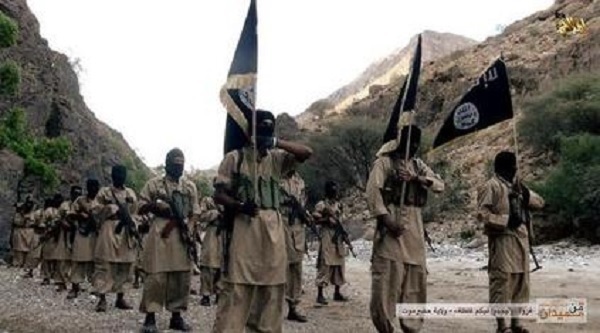
Militants from Al-Qaeda in the Arabian Peninsula (AQAP), which has been supported by the US and Saudi Arabia in Yemen
Secretary of State Mike Pompeo claimed the terrorist designation was part of Washington's drive to weaken Iranian influence in the region, as part of the US-led propaganda drive to paint the group as a mere "Iranian proxy."
But though the Houthis have received political and media support from Iran, they are an independent indigenous group whose resistance struggle is deeply ingrained in Yemen's history.
Like the Lebanese nationalist group Hezbollah, which is often compared to Ansar Allah, the Houthis are allies of Iran, but they are independent. Both grew out of indigenous struggles against attempted foreign domination of their countries - the Israeli war on Lebanon in the case of the former, and Saudi aggression in the case of the latter.
Ansar Allah, which adopted the slogan "Death to America, Death to Israel," has also demonstrated a consistent anti-imperialist ideology and support for global resistance movements.
The Houthi government refuses to recognize Israel and vociferously promotes the Palestinian liberation struggle. It has also backed the Syrian government and its allies against Western-sponsored Salafi-jihadist militants.
Consistent with their ideology, the Houthis publicly expressed solidarity with Venezuela against the US-led coup attempt to install Juan Guaidó in 2019. Back in 2015, a senior Ansar Allah leader told journalist Safa al-Ahmad, "We will help oppressed people all over the world... We support Chávez in Venezuela. Why this insistence that we receive support from Iran, other than wanting to turn the struggle in this country and the region into a sectarian one, based on the American and Zionist agenda?"
Yemenis from the Houthi movement and leftist parties hold a solidarity rally with Venezuela against a US coup attempt, in Sanaa in 2019
The US terrorist designation is clearly meant to criminalize the Houthi movement, and the majority of Yemen as a whole, for its resistance to Washington's geopolitical interests.
This labeling is ironic, because Yemenis have themselves held numerous protests under the banner, "No to American Terrorism on Yemen."
Inside Yemen (full documentary) | FRONTLINEInside Yemen (full documentary) | FRONTLINE“People are not seeing what’s going on. We’re talking thousands of civilian dead.†[Subscribe on YouTube: http://bit.ly/1BycsJW] In May, FRONTLINE filmmaker ...“People are not seeing what’s going on. We’re talking thousands of civilian dead.†[Subscribe on YouTube: http://bit.ly/1BycsJW] In May, FRONTLI...
During a protest marking the anniversary of the US-Saudi coalition bombing of a funeral hall that killed more than 140 people and wounded 600 more, Yemenis erected a blood-stained, demonic Statue of Liberty holding American and Israeli bombs, alongside a sign reading, "USA Kills Yemeni People."
This is the rally Yemenis held today
In a viral photo, a Yemeni man dressed up as Donald Trump, posing with an American flag cape and hat reading "oil" in front of a cow covered by a Saudi flag, standing above an Israeli flag.
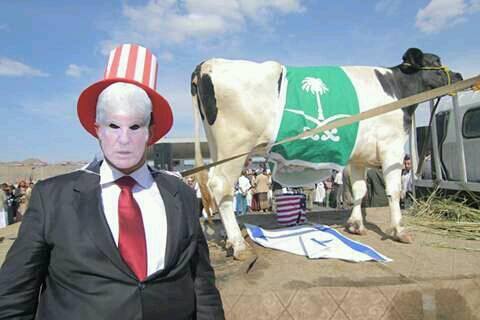
A Yemeni man at a "Stop U.S. Terrorism on Yemen" protest in Sanaa in 2017
The US terrorist designation of Ansar Allah recalls similar labels applied to other national-liberation movements in the Global South.
South African anti-apartheid leader Nelson Mandela was on the US government's terrorism list until 2008 (after the CIA helped the apartheid regime imprison him for 27 years).
Mandela's African National Congress, or ANC, was designated a terrorist organization by Washington because of its support for armed struggle against South Africa's US-backed apartheid regime. The ANC remained on the US terrorist list even after it became the elected government of the country's post-apartheid democracy.
But the US government's terrorist labeling of the Houthis is doubly hypocritical, considering Washington's cozy relationship with al-Qaeda in Yemen.
Mainstream corporate media extensively documents US alliance with al-Qaeda in Yemen
The existence of a de facto alliance between the United States, Saudi Arabia, and al-Qaeda is not just speculation by anti-war journalists; it has been acknowledged by mainstream corporate media outlets.
The Western and Gulf monarchy alliance with the notorious Salafi-jihadist terrorist group has been known since the very beginning of the international war on Yemen in 2015.
In July 2015, the Wall Street Journal published a report acknowledging that "Local militias backed by Saudi Arabia, special forces from the United Arab Emirates and al Qaeda militants all fought on the same side this week to wrest back control over most of Yemen's second city, Aden, from pro-Iranian Houthi rebels."
The Journal continued: "Saudi-backed militias are spearheading efforts to roll back Houthi gains and reinstate the government that the rebels drove into exile in neighboring Saudi Arabia. But they have turned to Yemen-based al Qaeda in the Arabian Peninsula, or AQAP, for help, according to local residents and a senior Western diplomat. This puts the U.S.-allied Gulf kingdom on the same side as one of the world's most notorious extremist groups."
After al-Qaeda helped US-backed Yemeni forces expel the Houthis from the major southern city of Aden, "AQAP militants celebrated the victory alongside the militias, parading cadavers of Houthis on a main commercial street in the city to a cheering crowd," the Wall Street Journal wrote.
Aden residents told the newspaper that they saw al-Qaeda flags flying all across the city.
The US government was well aware of the fact that it was strengthening al-Qaeda in Yemen. However, it continued to place the responsibility on Yemen's Ansar Allah movement. The Journal reported, "American officials acknowledge that AQAP is one of the war's biggest benefactors, but say Houthi rebels are ultimately to blame."
In February 2016, video evidence of the dark alliance emerged for the first time. Journalist Safa al-Ahmad filmed forces from the US-, Saudi-, and UAE-backed coalition fighting alongside al-Qaeda against the Houthis, battling for control of the major city of Taiz. She published the footage with the BBC.
In January 2017, a United Nations panel of experts published an annual report on the Yemen war. The document ( PDF) acknowledged that al-Qaeda "members have also taken part in the fight in Ta'izz on the side of the 'resistance'against Houthi and Saleh forces" (referring to previous President Ali Abdullah Saleh, who had formed an uneasy alliance with the Houthis until he turned on them and was killed in 2017).
A few sentences before in the same report, the UN experts added, "The Panel also assesses that AQAP is actively working towards preparing terrorist attacks to be launched against the West using Yemen as a base." The statement represented a clear warning about the same kind of potential "blowback" attacks that American and European civilians have endured thanks to their governments' sponsorship of Salafi-jihadist fanatics.
Washington's support for al-Qaeda in Yemen under President Barack Obama was quietly acknowledged, but mostly ignored. When President Donald Trump came into office, however, corporate media outlets that had long whitewashed and ignored the Yemen war began to report more critically.
The Associated Press published a detailed investigation in August 2018 further documenting how US- and Saudi-backed coalition forces in Yemen " cut secret deals with al-Qaida fighters, paying some to leave key cities and towns and letting others retreat with weapons, equipment and wads of looted cash... Hundreds more were recruited to join the coalition itself."
"Coalition-backed militias actively recruit al-Qaida militants, or those who were recently members, because they're considered exceptional fighters," the AP wrote.
The news outlet noted that some Yemeni al-Qaeda extremists on the US terrorism list were simultaneously being funded by Gulf monarchies to lead troops in the US-backed coalition.
"Key participants in the pacts said the U.S. was aware of the arrangements and held off on any drone strikes," the report added.
"The larger mission is to win the civil war against the Houthis, Iranian-backed Shiite rebels. And in that fight, al-Qaida militants are effectively on the same side as the Saudi-led coalition - and, by extension, the United States," the AP report stated bluntly.
The news outlet quoted a fellow at the Jamestown Foundation, a Cold War-era neoconservative think tank close to the CIA, who admitted, "Elements of the U.S. military are clearly aware that much of what the U.S. is doing in Yemen is aiding AQAP and there is much angst about that... However, supporting the UAE and the Kingdom of Saudi Arabia against what the U.S. views as Iranian expansionism takes priority over battling AQAP and even stabilizing Yemen."
The damning AP investigation was followed by a 2019 CNN report which acknowledged that weapons sold by the United States to Saudi Arabia and the UAE were then transferred to al-Qaeda in Yemen.
US arms sold to Saudi Arabia and UAE end up in wrong handsThe US sold weapons to Saudi Arabia and the UAE. Now, some are in the hands of al Qaeda-linked fighters and Iranian-backed rebels in Yemen.
In branding the Houthi movement as terrorists, the United States has not only evinced a staggering level of hypocrisy; it has effectively given a gift to the same extremist organization it used to justify its so-called "war on terror."

